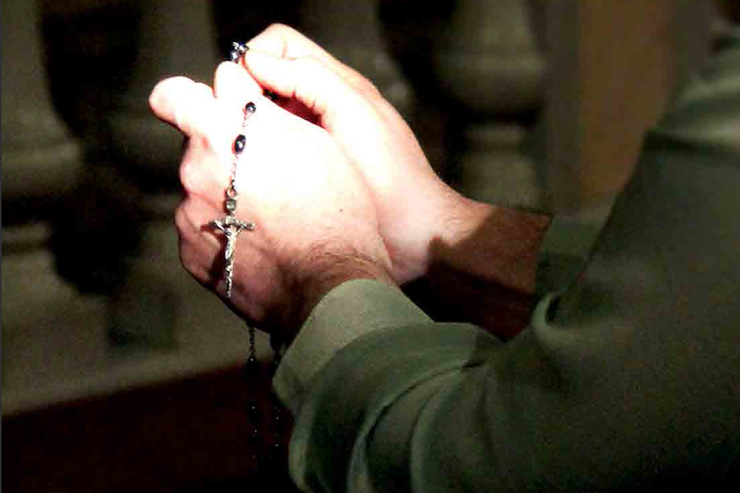
Return of the Prodigal Son by Murillo
In discussing the Catholic faith with non-Catholics, the doctrine concerning confessing one’s sins to a priest often arises. Indeed, in my experience, the Sacrament of Reconciliation ranks right up there with Marian Dogmas among the Church’s teachings that prompt the most questions from those inquiring about the Catholic Faith. The following objections to the doctrine are those about which I am most often asked to respond.
Objection #1 – Only God can forgive sin.
Catholics teach that a priest can forgive sin, but a priest is only a man. Isn’t it true that only God can forgive sin? I don’t mean in a way that any of us can forgive one another, but in the way that God forgives and saves us.
Reply to Objection #1:
It is true that only God can forgive sin (on His own authority). But, God has chosen to delegate that authority. When a priest with faculties to absolve sin says the words of absolution during Confession, he forgives the penitent’s sins by the power and authority of Christ conferred to that priest through Holy Orders. The priest thus acts in the person of Christ (in persona Christi).
Christ delegated this authority to his priests much in the same way that any higher authority delegates its authority to its ambassadors and others who represent the higher authority.
Objection #2 – The bible does not teach that a man can forgive sin.
What you said seems to me to be a man-made explanation, not God’s teaching. Show me where you find this in the bible.
Reply to Objection #2:
That men are delegated the authority from God to forgive sin on his behalf is clearly a part of Divine Revelation. Two passages show this ambassadorial relationship.
“And there people brought to him a paralytic lying on a stretcher. When Jesus saw their faith, he said to the paralytic, ‘Courage, child, your sins are forgiven.’ At that, some of the scribes said to themselves, ‘This man is blaspheming.’ Jesus knew what they were thinking, and said, ‘Why do you harbor evil thoughts? Which is easier, to say, ‘Your sins are forgiven,’ or to say, ‘Rise and walk’? But that you may know that the Son of Man has authority on earth to forgive sins’ – he then said to the paralytic, ‘Rise, pick up your stretcher, and go home.’ He rose and went home. When the crowds saw this they were struck with awe and glorified God who had given such authority to human beings.” (Matthew 9:2-8, emphasis added)
“So whoever is in Christ is a new creation: the old things have passed away; behold, new things have come. And all this is from God, who has reconciled us to himself through Christ and given us the ministry of reconciliation, namely, God was reconciling the world to himself in Christ, not counting their trespasses against them and entrusting to us the message of reconciliation. So we are ambassadors for Christ, as if God were appealing through us. We implore you on behalf of Christ, be reconciled to God.” (2 Corinthians 5:17-20, emphasis added)
There are two means by which sin is forgiven through the agency of man according to the bible.
a) Through Baptism
Before a person is baptized, he is guilty of Original Sin and, if baptism occurs after the age of reason, of personal sin. When a person is baptized, all personal sin, Original Sin and the punishments due to sin are wiped clean. The baptized believer is thus born again and receives the grace of justification. Protestant terminology says that this person is justified and saved. Catholic terminology says that this person’s soul is in the state of Sanctifying Grace. Not all Protestants believe that baptism is necessary to be justified and saved. But the following passages demonstrate the truth of the Catholic teaching.
Christ commanded his apostles to baptize.
“The eleven disciples went to Galilee, to the mountain to which Jesus had ordered them. When they saw him, they worshiped, but they doubted. Then Jesus approached and said to them, ‘All power in heaven and on earth has been given to me. Go, therefore, and make disciples of all nations, baptizing them in the name of the Father, and of the Son, and of the Holy Spirit, teaching them to observe all that I have commanded you. And behold, I am with you always, until the end of the age.’” (Matthew 28:16-20)
Baptism is a condition of salvation.
“He said to them, ‘Go into the whole world and proclaim the gospel to every creature. Whoever believes and is baptized will be saved; whoever does not believe will be condemned.’” (Mark 16:15-16, emphasis added)
Peter preached that repentance and baptism is for the forgiveness of sin.
“Peter (said) to them, ‘Repent and be baptized, every one of you, in the name of Jesus Christ for the forgiveness of your sins; and you will receive the gift of the Holy Spirit.’” (Acts 2:38, emphasis added)
Peter teaches that baptism saves the believer.
“For Christ also suffered for sins once, the righteous for the sake of the unrighteous, that he might lead you to God. Put to death in the flesh, he was brought to life in the spirit. In it he also went to preach to the spirits in prison, who formerly did not obey, when God’s patience waited in the days of Noah, during the building of the ark, in which a few, that is, eight persons, were saved through water. Baptism, which corresponds to this, now saves you, not as a removal of dirt from the body but as an appeal to God for a clear conscience, through the resurrection of Jesus Christ…” (1 Peter 3:20-21, emphasis added)
Ananias instructs Paul that baptism will wash away his sin.
“A certain Ananias, a devout observer of the law, and highly spoken of by all the Jews who lived there, came to me and stood there and said, ‘Saul, my brother, regain your sight.’ And at that very moment I regained my sight and saw him. Then he said, ‘The God of our ancestors designated you to know his will, to see the Righteous One, and to hear the sound of his voice; for you will be his witness before all to what you have seen and heard. Now, why delay? Get up and have yourself baptized and your sins washed away, calling upon his name.’” (Acts 22:12-16, emphasis added)
b) Through Confession of Sin to God’s minister (a priest)
Baptism does not remove a person’s inclination to sin (called concupiscence by Catholics). Therefore, it is likely that a baptized believer will personally sin after baptism. Some of those sins might be so grave that they result in the loss of Sanctifying Grace. God does not pretend that this does not happen. Instead, in his mercy, God has provided an ordinary means for such a sinner to appeal to him for forgiveness and a restoration of grace, similar to when he was first saved through Baptism.
Jesus gave his Apostles the authority and power to forgive sin as documented in John 20. Some Protestants will argue that this pertains to preaching the Gospel and that forgiveness results from the faith of the believer alone. The argument goes, “The gospel is preached, those who accept it are forgiven their sins, those who don’t have their sins retained.” Of course this is not at all what the text says:
“On the evening of that first day of the week, when the doors were locked, where the disciples were, for fear of the Jews, Jesus came and stood in their midst and said to them, ‘Peace be with you.’ When he had said this, he showed them his hands and his side. The disciples rejoiced when they saw the Lord. Jesus said to them again, ‘Peace be with you. As the Father has sent me, so I send you.’ And when he had said this, he breathed on them and said to them, ‘Receive the holy Spirit. Whose sins you forgive are forgiven them, and whose sins you retain are retained.’” (John 20:19-23, emphasis added)
Paul speaks of the ministry of reconciliation and the ambassadorial relationship he exercises.
“So whoever is in Christ is a new creation: the old things have passed away; behold, new things have come. And all this is from God, who has reconciled us to himself through Christ and given us the ministry of reconciliation, namely, God was reconciling the world to himself in Christ, not counting their trespasses against them and entrusting to us the message of reconciliation. So we are ambassadors for Christ, as if God were appealing through us. We implore you on behalf of Christ, be reconciled to God.” (2 Corinthians 5:17-20, emphasis added)
How is the believer reconciled to God? The passages above clearly show the involvement of God’s ministers in the process of reconciliation. More is required than faith or belief alone. James makes this point in his epistle:
So also faith of itself, if it does not have works, is dead. Indeed someone might say, “You have faith and I have works.” Demonstrate your faith to me without works, and I will demonstrate my faith to you from my works. You believe that God is one. You do well. Even the demons believe that and tremble. (James 2:17-19, emphasis added)
Objection #3 – But I don’t need a priest, I can go directly to God and ask forgiveness.
I have a personal relationship with the Lord. I often go to him in prayer, asking him to forgive my sins. Why would I need a priest to get in the way?
Reply to Objection #3:
Anyone, of course, can go directly to God and pray for forgiveness. Indeed we should do so as soon as we are aware of having sinned. But the Church teaches and the scriptures support that God desires people to confess to him through his priests.
The Jewish leaders persisted in accusing Jesus of forgiving sins. And Jesus admitted that he did. The above passage from Matthew 9 demonstrates that Jesus did so in his human nature, having authority from God. In the above passage from John 20, Jesus states specifically that he was passing on this ministry and authority, given him by the Father, to his apostles. People of his day denied that Jesus had this power. It is no wonder that some in our day deny that his priests have this power.
Whether or not one understands the why… the what and how are clear. God desires it, so we should do it.
Objection #4 – If you are saved, nothing more is required.
When a person is saved, he cannot lose his salvation. All of your arguments presume that one can lose salvation.
Reply to Objection #4:
This reveals a misunderstanding of how we are saved. First, the sacraments are not works of men, but of God who works through his sacraments. It is no more a work for a person to present himself for baptism or to confess his sins to a priest than it is for a person to answer an altar call in a protestant service or to pray the Protestant’s “Sinner’s Prayer”.
Second, a person must do more than believe to be saved, he must do something… cooperate with God’s grace in some way… be baptized… seek forgiveness from God in the way that God desires… (see above passages). God’s loving call to us demands our response. Our baptism and our sacramental confessions are simply necessary components of that response as are our acts of faith, hope and love.
Third, salvation can indeed be lost. When we accept God’s invitation through belief and baptism, we are justified (receive Sanctifying Grace) and have begun the process of salvation through an ongoing conversion. It is possible to reject this freely offered gift of salvation from God through future sin. If we lose this grace, we once again accept his call through sacramental confession. The notion of “once save, always saved” is not only not found in scripture, we are warned against believing in such a thing.
“Now I am reminding you, brothers, of the gospel I preached to you, which you indeed received and in which you also stand. Through it you are also being saved, if you hold fast to the word I preached to you, unless you believed in vain.” (1 Corinthians 15:1-2, emphasis added)
“All this I do for the sake of the gospel, so that I too may have a share in it. Do you not know that the runners in the stadium all run in the race, but only one wins the prize? Run so as to win. Every athlete exercises discipline in every way. They do it to win a perishable crown, but we an imperishable one. Thus I do not run aimlessly; I do not fight as if I were shadowboxing. No, I drive my body and train it, for fear that, after having preached to others, I myself should be disqualified.” (1 Corinthians 9:23-27, emphasis added)
“Therefore, whoever thinks he is standing secure should take care not to fall. No trial has come to you but what is human. God is faithful and will not let you be tried beyond your strength; but with the trial he will also provide a way out, so that you may be able to bear it.” (1 Corinthians 10:12-13, emphasis added)
“Now I am speaking to you Gentiles. Inasmuch then as I am the apostle to the Gentiles, I glory in my ministry in order to make my race jealous and thus save some of them. For if their rejection is the reconciliation of the world, what will their acceptance be but life from the dead? If the firstfruits are holy, so is the whole batch of dough; and if the root is holy, so are the branches. But if some of the branches were broken off, and you, a wild olive shoot, were grafted in their place and have come to share in the rich root of the olive tree, do not boast against the branches. If you do boast, consider that you do not support the root; the root supports you. Indeed you will say, ‘Branches were broken off so that I might be grafted in.’ That is so. They were broken off because of unbelief, but you are there because of faith. So do not become haughty, but stand in awe. For if God did not spare the natural branches, (perhaps) he will not spare you either. See, then, the kindness and severity of God: severity toward those who fell, but God’s kindness to you, provided you remain in his kindness; otherwise you too will be cut off.” (Romans 11:13-22, emphasis added)
Objection #5 – Evidence shows that Catholic Sacraments do not work.
Confession is nothing more than a permission slip to keep on sinning. People keep on sinning after going to Confession, so it doesn’t work. Same with the Sacrament of the Sick – people are anointed but die anyway. Doesn’t this prove that your sacraments are not effective?
Reply to Objection #5:
In regards to the Sacrament of the Sick, the Church does not teach that it is a guaranteed remedy for bodily illness. While it may be God’s will to heal bodily illness through the sacrament on some occasions, it is also a sacrament that heals our spiritual sickness and prepares us for death. It is clearly illustrated in scripture.
“Is anyone among you sick? He should summon the presbyters of the church, and they should pray over him and anoint (him) with oil in the name of the Lord, and the prayer of faith will save the sick person, and the Lord will raise him up. If he has committed any sins, he will be forgiven.” (James 5:14-15)
In regards to the sacrament of Confession, it is taught that the grace of the sacrament helps the person to avoid future sin; it is not taught that the sacrament is a guarantee against all future sin. The Sacrament of Confessions is no more a permission slip to keep on sinning than is what Protestants mean by “accepting Jesus and one’s personal Lord and Savior”.
Into the deep…
Deacon Mike Bickerstaff, Editor-in-Chief for The Integrated Catholic Life™, is the Director of Adult Education and Evangelization at his parish and a deacon of the Roman Rite for the Archdiocese of Atlanta.
Please help us in our mission to assist readers to integrate their Catholic faith, family and work. Tell your family and friends about this article using both the Share and Recommend buttons below and via email. We value your comments and encourage you to leave your thoughts below. Thank you! – The Editors














